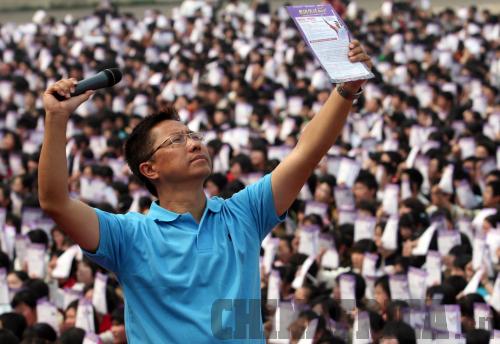|
|

|
|
I'M SORRY:Celebrity Li Yang has appologized for abusing his wife (HU WEIGUO) |
When Li Yang came up with his innovative English training program Crazy English more than a decade ago, he was dubbed an English educator and education philanthropist enjoying a lofty social status. Today, Li is back in the spotlight, but this time as a wife-beater.
On August 31, Kim Lee, Li's American wife, posted the images of her badly beaten face, knees and ears on Sina Weibo, China's largest microblog website, claiming she had suffered serious domestic violence at the hands of Li Yang. In the following four days, Lee continued to upload her images and the shocking domestic violence case was widely covered by media.
Though Li later apologized to his wife, swore not to harm her again, and went to therapy, this case is a reminder of how serious domestic violence is in Chinese families. According to Li, the conflicts between him and his wife existed for many years and kept escalating.
Statistics from the China Law Society show that 35.7 percent of Chinese families experience domestic violence and more than 90 percent of the victims are women, children and the aged.
Domestic shame
"Influenced by the Chinese traditional concept of 'domestic shame should not be made public,' many women choose to keep silent when they are abused by their husbands," Tan Lin, Director of Women's Studies Institute of China, told ChinAfrica.
Xu, a mother of two children who only gave her surname, has been living with violence. She lives in Zaozhuang City of east China's Shandong Province and her husband is an official in local government.
"To many women, I seem to be successful as I have two lovely children and a husband working for the government," Xu told ChinAfrica. "That's why I must pretend to be happy with my husband in front of others, especially my friends, and never tell them my husband often beats me."
This cultural attitude means many domestic violations cannot be made public and so society cannot help.
According to Wang Xingjuan, Director of the Maple Women's Psychological Counseling Center (MWPCC) of Beijing, covering up violence could further escalate the problem. "We Chinese people should first change our concept [toward domestic violence] before we can really help women out of domestic violence."
Wang's remarks make sense to some extent. According to statistics from Henan Provincial Women's Federation, after Kim Lee publicized her experiences on the Internet, the number of the calls from women complaining domestic violence doubles.
|